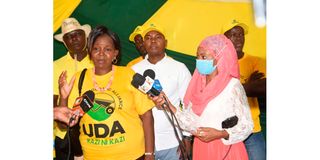Feminists: End election-related violence against women

Esther Kipng'etich, a political aspirant, speaks to the media after police disrupted her meeting in a Mombasa hotel last June. Feminists have called for an end to structural barriers to enable women take an active role in political processes.
What you need to know:
- Feminists have said countries cannot attain active participation of women in political processes if they do not address the structural issues affecting them.
- The African feminists called for end to election-related violence against women and insecurity, which keep them away from governance and democratic processes.
Countries cannot attain active participation of women in political processes if they do not address the structural issues affecting them, feminists have said.
Studies show that unpaid care and discriminatory laws and institutions are major structural barriers blocking women from fully engaging in a country’s governance and democratic processes.
“Social norms make women more vulnerable to violence, yet they are excluded from peace building processes. The definition of electoral violence is usually exclusive of the specific issues that affect women and youth,” gender policy and advocacy specialist Wanyana Racheal, said during an October 28 Regional Women's Political Leadership Convention.
Feminist leadership
The meeting was hosted by Akina Mama wa Africa, a Pan-African feminist leadership development organisation.
The specialist emphasised that addressing the structural barriers was a pathway to enabling women take an active role in political processes.
The African feminists unanimously called for end to election-related violence against women and insecurity, which keep them away from governance and democratic processes.
“Election-related violence is a result of conflict in agenda; the fear of a regime to be put out of power and continuous human rights violations that trigger electoral violence,” a Ugandan feminist, Lydia Namayengo said.
For Uganda’s retired Justice Mary Maitum, it is time for women to unite and demand leaders to be accountable on maintaining peace across Africa.
“We should hold our leaders responsible for the lack of peace and whatever wrong they do. There is need to come together for female diplomacy as we seek for accountability from our leaders,” she said.
Economic independence
Fellow feminists gathered in Nairobi early October where they also demanded for equal representation in all relevant institutions making decisions on post-Covid-19 recovery measures
“All post-Covid-19 recovery measures must be rooted in feminist principles of inclusivity, equality, justice, solidarity and well-being,” said Emma Kaliya, chairperson to the board of African Women's Development and Communication Network (Femnet) during the October 12, conference.
With Covid-19 having disproportionately impacted on women’s economic independence, key to sustaining their presence in politics, having their equal representation would ensure they are not left behind, they argued.
“Without immediate action by the international community, national governments, civil society and the private sector, only the handful of nations that hold the greatest amount of global wealth will recover,” said Femnet Executive Director Memory Kachambwa
“Girls and women cannot wait.”





